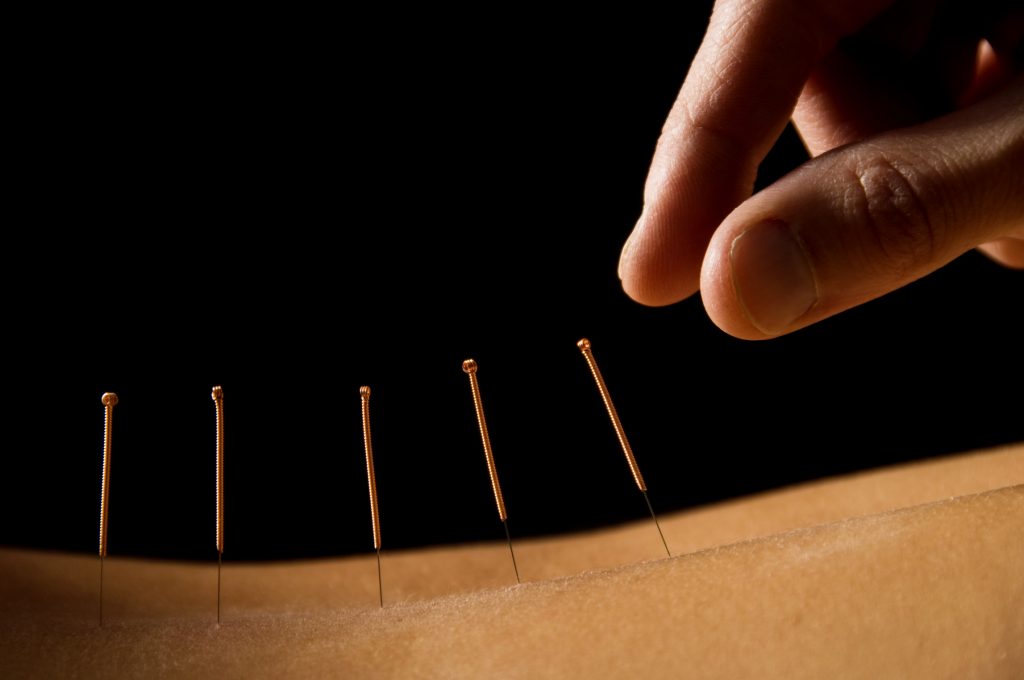
Acupuncture
What is acupuncture?
Acupuncture is simply the use of very fine needles put into the body to help it heal.
It is also known as dry needling as no chemicals or medicines are injected into the body. Other names include trigger point acupuncture and intramuscular stimulation. These are all basically the same thing depending on how the needles are used.
I practice Western Medical Acupuncture and am a lecturer and current President (at the time of writing) for the British Medical Acupuncture Society. This means that I make a diagnosis in the usual medical way, and then use needles for treatment. I use acupuncture to treat conditions based on scientific studies where it has been shown to work or where it is likely to work. Sometimes using medicines or injections alongside acupuncture can also be useful. As with modern medicine, my practice changes as science develops.
How is acupuncture done?
Acupuncture involves the insertion of fine, disposable needles into the skin and/or muscle. The needles are left in place for anything from a few minutes to about half an hour. They can be stimulated by hand or by using a small electrical current (electroacupuncture) to give a stronger effect. The number of needles used can be anything from 2-3 or more and depends on the problem being treated. It may be worth treating new problems up to twice per week, but long term conditions are generally treated once per week for 5-8 sessions.
Does it hurt?
Usually, there is no pain when the needles are put into the skin. However, there may be a deep aching, burning or heaviness when the needles are inserted into muscles.
What is acupuncture useful for?
- Pain, especially musculoskeletal pain including back, neck, shoulder, and knee pain
- Chronic headache (see NICE guideline CG150 for the use of acupuncture in migraine and tension-type headache)
- Nausea and vomiting, particularly postoperative nausea and vomiting
- Overactive bladder and stress incontinence
- Chronic constipation
- Xerostomia (dry mouth)
- Dysmenorrhoea (painful periods), polycystic ovarian disease (PCOS), infertility, menopausal symptoms
- Nasal allergy and sinus problems
How does acupuncture work?
- Local effects: acupuncture stimulates nerves in skin and muscle, and increases local blood flow which promotes healing.
- Pain relief: acupuncture stimulates the central nervous system to block or partially block pain signals (closing the ‘gate’).
- Activating the body’s own pain relieving system: by the activation of morphine-like substances in the body and the body’s own pain-relieving circuitry.
- Well-being effects: Acupuncture improves the mood aspects of pain and increases feelings of well-being. This can result in a calming effect, euphoria and relaxation. It can also affect the “fight-flight” nervous system which can be useful in treating musculoskeletal conditions and overactive bladder disorders for example.
Is acupuncture safe?
Inserting needles into the body can be potentially dangerous. However, in the hands of a trained health profession acupuncture is generally a very safe. In over 20 years of practising acupuncture, not even one of my patients has come to any harm.
The biggest safety study so far involved over 200,000 patients and showed that acupuncture was relatively safe: (Forsch Komplementmed 2009; 16(2): 91). Over half of the side-effects were trivial such as minor bleeding and bruising at the site of needle insertion.
How to book an appointment
First appointments are ideally 1 hour long to allow a full assessment and to do the first acupuncture treatment. Half an hour appointments can also be booked to start with, and treatment sessions booked afterwards.
E-mail: amer.sheikh@bedsidemanner.uk
